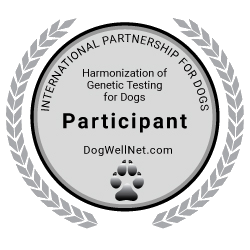Progressive retinal atrophy (rcd4-PRA)
The Progressive Retinal Atrophy(PRA) leads to a degeneration of the retina and results in...lisää
Disease
Progressive retinal atrophy (PRA) is a leading hereditary cause of blindness in pedigree dogs as is its counterpart retinitis pigmentosa (RP) in humans. PRA shows genetic heterogeneity, as does RP, with several distinct forms already recognized and several more remaining to be investigated. One can distinguish between late onset forms of PRA and early onset (whelp-age) dysplastic changes. The clinical and ophthalmologic signs of both forms are similar. Affected dogs suffer from bilateral Mydriasis, the reflection of the Tapetum lucidum is increased and the retinal vascular network appears atrophic.
The Rod-cone-dysplasia type 4 (rcd4-PRA) -PRA is characterised as a Late Onset PRA (LOPRA). Night blindness is a typical first symptom of the disease, usually seen at the age of 5-12 years. The rcd4-PRA initially has been identified in the breed Gordon Setter, but also has been found in several other breeds so far.
Please note that besides to the rcd4-PRA, there are other PRA forms known to cause visual impairement in several of the described breeds.
The Rod-cone-dysplasia type 4 (rcd4-PRA) -PRA is characterised as a Late Onset PRA (LOPRA). Night blindness is a typical first symptom of the disease, usually seen at the age of 5-12 years. The rcd4-PRA initially has been identified in the breed Gordon Setter, but also has been found in several other breeds so far.
Please note that besides to the rcd4-PRA, there are other PRA forms known to cause visual impairement in several of the described breeds.
Breed
Australian Cattle Dog,
English Setter,
Gordon Setter,
Irish Red and White Setter,
Irish Red Setter,
Kleiner Münsterländer,
Miniature Poodle,
Old Danish Pointing Dog,
Polish Lowland Sheepdog (PON),
Poodle,
Tatra Shepherd Dog,
Tibetan Terrier,
Toy Poodle
Heredity
autosomal recessive
Test duration
1-2 weeks after arrival of the sample in the lab


